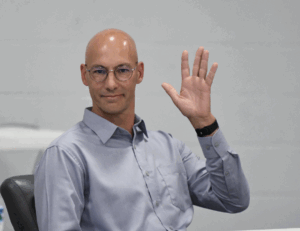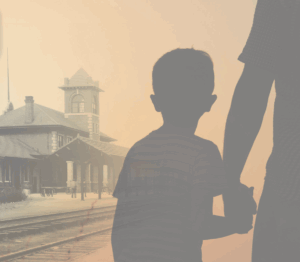
Housing is a fragile thing
We are all one misstep, one lost paycheck, one serious health diagnosis, one tragedy away.
It could be anyone.
And it is, all of us — from every background, every neighborhood.
For many, it is hard to look at the need, the faces of those who are forced into decisions about where to find shelter, food for their families, how to pay for medicine, a way to turn their lives around.
We don’t want to think about how easily it could be someone we know and love, how it could be us.
And more and more, with the economic pressures many families are facing getting worse, there are more people worried about what will come next — and they are even closer to the tipping point, the moment when they simply can’t make ends meet anymore.
And those who are struggling are not just families. Our seniors, our veterans — they need support, too.
We are facing a crisis in every corner of our community — one that the organizations tasked with helping say is getting out of control.
The truth is, there is just not enough money to give these struggling families the relief they need — and there are so many bureaucratic rules that get in the way.
And to start the process of what to do next, we have to look at the harsh facts — to look at the need straight on, even if it is hard.
First things first.
Homelessness is not just about addiction, mental illness, and living in the woods.
We have done that story.
We have spent time in Goldsboro’s Tent City.
We shared with you the raw testimonials of some of the people living there.
But the population living beyond the tree line next to the railroad tracks along Royall Avenue represent only a fraction of those in need.
If you read our piece “Hitting home” today, you’ll find that Wayne County’s homeless are single moms escaping domestic violence.
They are working fathers who are just barely making ends meet.
They are caretakers who lost that loved one and the house they were living in while they were tending to a dying parent.
Many live in local hotels — trying, every single day, to scrounge up enough money to pay for the next.
And did you know that there are people living in their cars in this community?
Right now.
Others are camping out on a family members’ couch.
You don’t see them, but they, too, are homeless.
Many of them work.
In fact, some have jobs in major organizations in this community.
At least one is a Wayne County Public Schools teacher.
They live paycheck to paycheck and if that one disaster strikes — a prolonged illness or a significant expense like a major car repair or funeral costs for a loved one — they are wiped out.
Now, they can’t make rent and get evicted.
They don’t have a wealthy family member to bail them out.
And with no nest egg, they can’t afford a security deposit or the upfront costs necessary to turn the lights and water on.
They find themselves in poverty’s grip.
And from that moment on, they live on the edge — ashamed and unsure of how to make a fresh start.
So, the lucky ones live in that hotel room not knowing if they will still have a roof over their heads the next night.
Others work a job — or two — and still cannot quite get ahead.
They are stuck.
And the shocking part of it is that they could be right next to you — a colleague, a neighbor, someone you go to church with — and you would never know.
So, there are some harsh realities that we as a community have to face, not just now during the holiday season, but as we move forward into the future.
Sometimes, poverty is triggered by a calamitous event — a non-overcomeable obstacle that a family or individual doesn’t see coming.
But yes, sometimes a lack of education, skills, or a high school diploma sentences someone to a life of just getting by.
Add in one of those “unfortunate circumstances,” and there is no way out but living on a park bench or, at best, at the Irish Inn.
The good news?
There are solutions.
Donating to organizations like Tommy’s Foundation will help in the here and now.
Babies will get diapers and rent will be covered for those who have no lifeline — like the single mother you will meet in our cover story who fled an abusive situation, but can’t work because she has nobody to look after children who are not quite old enough for school.
And in the long term, we need a stronger education system — and more programs that allow those who are struggling the chance to move themselves forward.
We need second chances, and sometimes, a third.
And we need a resource system that isn’t just a couple of organizations and a massive social services behemoth that gives families handouts but no chance at a hand up.
What good is help if, when you get it, bettering yourself means losing the benefits that gave you that hand up in the first place?
And there are some other harsh realities we must face.
Reasonably priced, quality housing matters.
And we don’t mean the projects.
Frankly, there are too many of them here. And if we’re being honest, sometimes, they attract crime and other ills.
No child should have to grow up in a place where, just a few nights ago, a 9-year-old was hit by a bullet in the wee hours of the morning.
So, let’s acknowledge that rents are high here — that finding decent, affordable housing can be difficult.
And let’s also agree that having a home makes a difference, both for a child and for a family.
Just ask Habitat for Humanity what happens when those keys change hands.
Those moments change generations of lives.
But even as we examine the reasons behind homelessness and the challenges those in poverty face, we have to get real about the other side of the coin.
There are good people caught in bad circumstances who just need a hand up.
But then there are the lifers — generational welfare recipients who teach their children how to work the system.
They take without accountability or responsibility, and they are part of the problem.
And maybe, if we get those bad actors off the payroll, we would have the money to invest in childcare, educational opportunities, and job placement and training for those who are really looking for a temporary blessing while they work to make their lives better.
That’s how you really give someone a “hand up.”
And when we do, we could start holding more of the people who use the system — and they are not just those who get the benefits, but also the bureaucrats and others getting rich off that same system — accountable.
Remember this: The fewer cheats we pay or reimburse, the more money we will have to change lives of those who really want to improve theirs.
And the sooner we understand that there are slum landlords right now in this community — some of them with pretty prominent names — preying on those who are struggling and those who have to rely on low-rent or subsidized housing, the sooner we can move forward with real change.
So, where do we start?
We have already taken a step forward.
The best way to help our neighbors who are struggling is to build a healthy, thriving community that attracts new investment — as in jobs, and good-paying ones at that.
But getting that boost also requires safe communities, good schools, and leaders who aren’t busy hiring their family members, running backroom quid pro quos, power-brokering, and hiring expensive consultants while collecting “perks” for themselves while the community they are supposed to be protecting disintegrates around them.
Let’s hope that we have finally gotten rid of a few of the people who don’t get that this community is on the razor’s edge.
And come November, we can get rid of a few more who don’t get it either.
So, yes, your participation matters.
And we don’t just mean checking a box on a pledge form — although that helps immediately.
We need real people to get involved and we need everyone else to vote.
We need those who really are trying to make a difference, who see firsthand the challenges families are facing, to speak up, loud and clear.
We need to address the elephants in the room — students who graduate unable to read even close to grade level, how under the microscope this community is when it comes to the future of the Air Force base, how many people that are in power have no business being there.
And you need leaders who are ready, willing, and able to not only tell it like it is, but to make the decisions that are necessary to make lasting change.
That’s how you turn homelessness into hope, and a community facing challenges into one with a bright future.
Let’s hope our new mayor and City Council are ready to step up to that challenge — and that the County Commissioners are prepared to share with us their plan as well.
Then, maybe we won’t have to “throw darts” to get things done.

A loaded discussion

Fighting for their lives

Goldsboro loses a giant

“I’m a flippin’ hurricane!”
Public Notices — Feb. 8, 2026

Belting it out

Legendary

Final Four!


